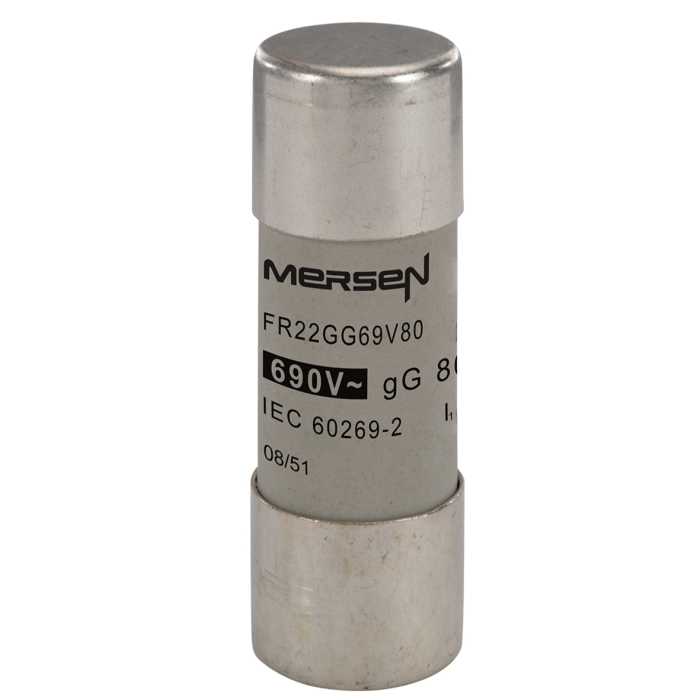Tehnilised dokumendid
Spetsifikatsioonid:
Brand
EatonCurrent Rating
80A
Fuse Size
22 x 58mm
Voltage Rating
500V ac
Body Material
Ceramic
Application Category
gG - gL
Series
BUSSMANN
Distrelec Product Id
30076498
Päritoluriik
Spain
Toote üksikasjad
Eaton IEC Cylindrical Fuses
The Eaton range of cartridge fuses is available for domestic electrical applications, from circuit breakers to plugs and sockets. These ceramic fuses are also available with an optional visual indicator.
What material are these made from?
All series of cylindrical fuse links have ceramic bodies and silverplated copper end caps.
Why choose ceramic cartridge fuse?
Ceramic and glass cartridge fuses have similar properties. The capacity of a ceramic cartridge fuse is higher than other fuses, which means that ceramic fuses can be used in circuits that have a higher current rating. They are perfect for protecting against overheating.
What size is it?
Sizes 8 x 32 mm, 10 x 38 mm, 14x51 mm & 22x58 mm in both Class gL-gG and aM are also available with a built-in striker for micro-switch operation and remote indication. Class gL-gG and aM fuse links are intended for industrial applications. All industrial fuse links are available with an operated visible fuse indicator.
What voltage is it?
This range of cylindrical cartridge fuses is available in a wide selection of physical sizes and current ratings for applications where the system voltage rating is 400, 500 and 690 Volts AC.
What is Breaking Capacity?
Breaking capacity is the level of current that the fuse can safely handle without exploding or breaking. The breaking capacity of your fuse should be greater than the fault current of your electronic circuit.
What are cartridge fuses used for?
• For the protection of components and equipment from costly damage used by over-current
• To isolate sub-systems from the main system once a fault has appeared
What is an overcurrent?
It is a setting where a circuit experiences a current that is higher than the normal operating current.
€ 54,50
€ 54,50 1 pakk 10 tk (ilma käibemaksuta)
€ 67,58
€ 67,58 1 pakk 10 tk (koos käibemaksuga)
1
€ 54,50
€ 54,50 1 pakk 10 tk (ilma käibemaksuta)
€ 67,58
€ 67,58 1 pakk 10 tk (koos käibemaksuga)
1
Lao andmed ajutiselt ei ole saadaval.
Palun kontrollige hiljem uuesti.
| kogus | Ühikuhind |
|---|---|
| 1 - 1 | € 54,50 |
| 2 - 4 | € 52,00 |
| 5+ | € 46,30 |
Tehnilised dokumendid
Spetsifikatsioonid:
Brand
EatonCurrent Rating
80A
Fuse Size
22 x 58mm
Voltage Rating
500V ac
Body Material
Ceramic
Application Category
gG - gL
Series
BUSSMANN
Distrelec Product Id
30076498
Päritoluriik
Spain
Toote üksikasjad
Eaton IEC Cylindrical Fuses
The Eaton range of cartridge fuses is available for domestic electrical applications, from circuit breakers to plugs and sockets. These ceramic fuses are also available with an optional visual indicator.
What material are these made from?
All series of cylindrical fuse links have ceramic bodies and silverplated copper end caps.
Why choose ceramic cartridge fuse?
Ceramic and glass cartridge fuses have similar properties. The capacity of a ceramic cartridge fuse is higher than other fuses, which means that ceramic fuses can be used in circuits that have a higher current rating. They are perfect for protecting against overheating.
What size is it?
Sizes 8 x 32 mm, 10 x 38 mm, 14x51 mm & 22x58 mm in both Class gL-gG and aM are also available with a built-in striker for micro-switch operation and remote indication. Class gL-gG and aM fuse links are intended for industrial applications. All industrial fuse links are available with an operated visible fuse indicator.
What voltage is it?
This range of cylindrical cartridge fuses is available in a wide selection of physical sizes and current ratings for applications where the system voltage rating is 400, 500 and 690 Volts AC.
What is Breaking Capacity?
Breaking capacity is the level of current that the fuse can safely handle without exploding or breaking. The breaking capacity of your fuse should be greater than the fault current of your electronic circuit.
What are cartridge fuses used for?
• For the protection of components and equipment from costly damage used by over-current
• To isolate sub-systems from the main system once a fault has appeared
What is an overcurrent?
It is a setting where a circuit experiences a current that is higher than the normal operating current.

